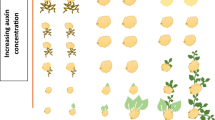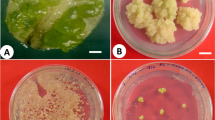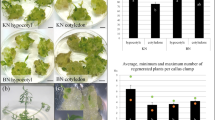Summary
The use of somatic embryos from cell culture systems in the clonal propagation of plants would be greatly facilitated if the somatic embryos could be dried and stored in a dormant state similar to true seeds. A cell culture system was developed for alfalfa (Medicago sativa L.) line RL34 which gave high yields of somatic embryos in an approximately synchronized pattern. These somatic embryos were treated with abscisic acid (ABA) at the cotyledonary stage of development to induce desiccation tolerance. With no visual preselection, approximately 60% of the dried embryos converted into plants upon reimbibition. When high quality embryos were selected prior to drying, 90 to 100% conversion rates were observed. The timing of the application of ABA in terms of embryo development was critical with an optimum being at cotyledonary stage spanning approximately 4 days; thus, synchronized embryo development is required for optimal expression in bulk samples. The vigor of the seedlings from dried somatic embryos was greater than those from embryos which had not been dried, but remained substantially lower than those from true seeds.
Similar content being viewed by others
References
Ackerson, R. C. Synthesis and movement of abscisic acid in water-stressed cotton leaves. Plant Physiol. 69:609; 1982.
Atanassov, A.; Brown, D. C. W. Plant regeneration from suspension cultures and mesophyll protoplasts ofMedicago sativa L. Plant Cell Tissue Org. Culture 3:149–162; 1984.
Bewley, J. D.; Black, M. Physiology and Biochemistry of Seeds, New York: Springer-Verlag; 1982.
Bingham, E. T.; Hurley, L. V.; Kaatz, D. M., et al. Breeding alfalfa which regenerates from callus tissue culture. Crop. Sci. 15:719–721; 1975.
Chen, T. H. H.; Gusta, L. V. Abscisic acid-induced freezing resistance in cultured plant cells. Plant Physiol. 73:71–75; 1983.
Crowe, J. H.; Crowe, L. M.; Chapman, D. Preservation of Membranes in Anhydrobiotic Organisms: The Role of Trehalose. Science 223:701–703; 1984.
Finkelstein, R. R.; Crouch, M. L. Hormonal and osmotic effects on developmental potential of maturing rapeseed. HortScience 22:780–797; 1987.
Gamborg, O.; Miller, R.; Ojima, K. Nutrient requirements of suspension cultures of soybean roots cells. Exp. Cell Res. 50:151–158; 1968.
Gray, D. J. Quiescence in monocotyledonous and dicotyledonous somatic embryos induced by dehydration. HortScience 22:810–814; 1987.
Gray, D. J.; Conger, B. V.; Songstad, D. D. Desiccated quiescent somatic embryos of orchardgrass for use as synthetic seeds. In Vitro Cell. Dev. Biol. 23:29–33; 1987.
Kermode, A. R.; Bewley, J. D. The role of maturation drying in the transition from seed development to germination I. Acquisition of desiccation tolerance and germinability during development of Ricinus communis L. seeds. J. Exptl. Bot. 36:1906–1915; 1985.
Keith, C. N.; McKersie, B. D. Acclimation of callus cultures of Lotus corniculatus L. to freezing stress. Plant Physiol. 80:766–770; 1986.
Kitto, C. L.; Janick, J. Hardening treatments increase survival of synthetically-coated asexual embryos of carrot. J. Amer. Soc. Hort. Sci. 110:283–286; 1985.
Mohapatra, S. S.; Poole, R. S.; Dhindsa, R. S. Abscisic acidregulated gene expression in relation to freezing tolerance in alfalfa. Plant Physiol. 87:468; 1988.
Nitzsche, W. One year storage of dried carrot callus. Z. Pflanzenphysiol. 100:269–271; 1980.
Priestley, D. A. Seed Aging. Cornell University Press. 1986.
Redenbaugh, K.; Slade, D.; Viss, P., et al. Encapsulation of somatic embryos in synthetic seed coats. HortScience 22:803–809; 1987.
Rikin, A.; Atsman, D.; Gitler, C. Chilling injury in cotton (Grossypium hirsutum L.): prevention by abscisic acid. Plant Cell Physiol. 20:1537–1546; 1979.
Senaratna, T.; McKersie, B. D.; Stinson, R. H. Simulation of dehydration injury to membranes from soybean axes by free radicals. Plant Physiol. 77:472–474; 1985a.
Senaratna, T.; McKersie, B. D.; Stinson, R. H. Antioxidant levels in germinating soybean seed axes in relation to free radical and dehydration tolerance. Plant Physyiol. 78:168–171; 1985b.
Zeevaart, J. A. D. Changes in the levels of abscisic acid and its metabolites in excised leaf blades of Xanthium strumarium during and after water stress. Plant Physiol. 66:672–678; 1980.
Author information
Authors and Affiliations
Rights and permissions
About this article
Cite this article
Senaratna, T., McKersie, B.D. & Bowley, S.R. Artificial seeds of alfalfa (Medicago sativa L.). Induction of desiccation tolerance in somatic embryos. In Vitro Cell Dev Biol 26, 85–90 (1990). https://doi.org/10.1007/BF02624160
Received:
Accepted:
Issue Date:
DOI: https://doi.org/10.1007/BF02624160




